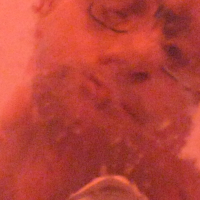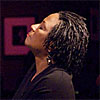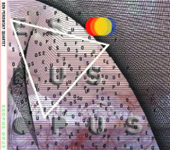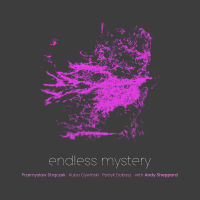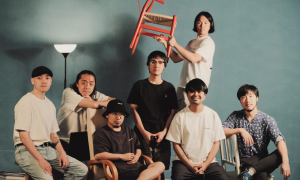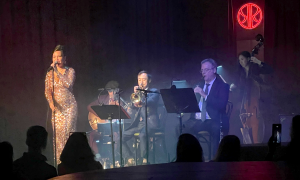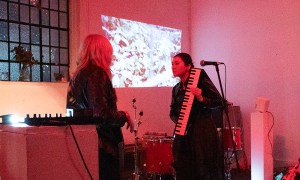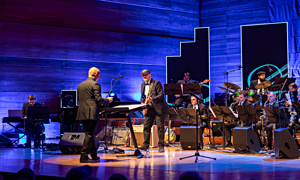Home » Jazz Articles » Live Review » Gent Jazz Festival 2009: Days 6-9
Gent Jazz Festival 2009: Days 6-9
Bijloke
Gent, Belgium
July 8-12, 16-19, 2009
Days 6-9 (July 16-19)
The second extended weekend of the Gent Jazz Festival is traditionally concerned with what might be called jazz peripherals, meaning music that might be electronic, poppy, rocky or countrified, but generally still possessing sympathetic elements that might entice the previous phase's crowd. The bonus is that the audience widens out into folks who might not usually attend a hardcore jazz sequence. Speaking of peripherals, the jazzfest itself is almost a peripheral to the mainline ten-day Gentse Feesten, which hauls its huge, sweaty ass into gear over this final weekend, rising (or descending?) into a maelstrom of city-wide artistic partying that demands a huge feat of stamina. A key element is the free riverside concert series organised by Polé Polé, Gent's long-established global music promoters. To coincide with this is the similarly lengthy 10 Days Off dance/electronica festival, held at the historic Vooruit arts centre.
Day 6 (July 16): Jamie Lidell/Briskey/DJ Squadra Bossa
Briskey
What finer representative of the Belgian electronica scene could there be, other than the mysteriously- named Briskey, a be-titfered upholder of the ancient trip hop traditions. Yes, this cinematically washy genre might be presumed quite dated now, over a decade on, but Briskey only settles into this category because there doesn't seem to be another way to describe his heavily evocative soundscaping wash. Briskey (alias Gert Keunen) has been active for around ten years, continually altering his approach until arriving at the present incarnation of widescreen atmospherica. Briskey's strategic knob-triggering is only part of an extended live band that he's built up around a sampling core, featuring drums, bass, keys, cello and a horn section. Dorona Alberti navigates the torch singer zone, swelling with an almost operatic drama. Or maybe a sepia tango styling from the 1920s is her stylistic template.
Right down in the depths lies the staggeringly low belch of bass saxophonist Nicolas Roseeuw, delivering the killer quake blow-lines on several pieces. Another shocking surprise arrives during the Fender Rhodes solo given by a so-far quite restrained Sara Gilis. Suddenly, she issues great cranked-up sounds of scabrous disintegration, being Briskey's second secret weapon. Each tune travels implacably onwards, inevitably gathering its sensuous layers until all elements are colliding in either a soothing or sometimes seething climax.
The experimental extremities of England's Jamie Lidell are becoming increasingly covert. His early work was concerned with an extremely ruptured outbreak of laptoppery twitchiness, but Lidell was barely concealing a love of classic soul music, blessed with a sweetly acrobatic voice that could always offer him a career beyond glitch-sampling. Over the last few albums, that's the way he's journeyed, with the modern soul songs taking precedence over the electro-cavortings. Even in his live set, Lidell has now reduced the amount of real-time sample layering and mixer-desk mischief. This is not necessarily a problem, but maybe a necessity if he wants to keep a more mainstream audience within his grasp. There aren't many avant gardists who also happen to have the skills of a charismatic entertainer, forever torn between the two temptations. He's very assured and relaxed, garbed in what look like pajamas and flip-flops. Meanwhile, saxophonists Andre Vida does not disappoint fans of his trans-gender attire. His bearded lady image continues as normal, and he's still wearing his accustomed flowery summer dress.
Besides having an arresting image, Vida blows a mean horn (sometimes two at the same time), and rolls around impressively on the stagefloor. Lidell won't allow himself such indignity, preferring the cheerful soulboy demeanour of rehearsed casualness, a master of kicking and swinging his old-school microphone stand. The songs are taut, bouncing, rubberised and slinky, rooted in the Sam Cooke sound, but informed by modern electronica. Lidell could be accused of entering into the tired old festival pact with some of his overdone audience interaction schemes, but ultimately the spangled songs transcend any such repetitiveness. It's a shame, though, that Lidell now appears to have jettisoned all visible irony in his quest for being the ultimate entertainer.
DJs play every evening, in-between the live sets, but by far the best such session of the festival is provided by Squadra Bossa, a team-up between Buscemi and Livingstone. They benefit from a strong general attendance, and a night of warm weather, but their melange of supple Afro-Latin-Caribbean beats produces the first stirrings of actual dancing in the outdoor garden cafe area. Slinky percussion webs graduate into almost-drum'n'bass, dubstep and reggaeton pumpings, as the pair feed off the crowd's ascending attention.
Day 7 (July 17): Rodrigo y Gabriela/Jose James & Jef Neve
Rodrigo y Gabriela
New York singer Jose James could be described as a descendant of both Mel Torme and Mos Def, using a smooth supper club croon as a bed for frequent turntable scratching impersonations. This is a very peculiar fusion, although highly attractive in its bending of the jazz form. Here, he's joined by the Belgian pianist Jef Neve, in an apparently impromptu liaison which produces a seamlessly slick result. The songs sound spontaneous and under-rehearsed, but don't suffer from this situation. James is a smooth operator, but not without a gleaming sense of humour, particularly in the way he'll stutter, slur and jerk in reverse time, just like manipulated vinyl. This set appears to be more jazz-orientated than his usual club-like performance, although this reviewer is hypothesising as it's a virgin exposure to the live James.
Rodrigo y Gabriela have become a gigantic-scale version of their previous selves. A few years back, it was possible to catch them at close quarters, playing their acoustic club set with a lusty sense of intimacy. Now, hardened by frequent festival experiences, they remain acoustic, but those properties are amplified into a monstrous sound, where Gabriela's fleet guitar-body rapping becomes as powerful as a fully booming drumkit, and the pair's ferocious strumming arrives at the volume level of the metal bands that were always such a strong background influence. This used to be an attitudinal thing, but now they have pomp to match. It's always possible to discern when a combo lives the exaggerated life of the rock festival audience engagement. Gestures bloat into dinosaur size, and this seems particularly strange when the Rod'n'Gab style is so theoretically descended from acoustic flamenco and general Spanish classical picking. Even so, they put on a spirited show, and the intricacy of their perpetual soloing (particularly Rodrigo's) never feels like gratuitous flash. They remain a band of the people. It's just that more people want to catch them now...
Day 8 (July 18): Marianne Faithfull
Often, in recent times, the English singer Marianne Faithfull will draw from jazz or cabaret standards, aging gracefully into being a purveyor of pre-rock'n'roll seediness. Now, she's decided to re-visit her late-1970s post-punk incarnation, touring with a fully riffing band and playing songs from her classic Broken English album. This period provides the current band's house style. She's also pushing last year's Easy Come, Easy Go collection of cover songs (produced by Hal Willner), most of them emanating from various periods of rock history. The new band features Roger Eno (brother of Brian) on keyboards, but is otherwise heavy on the youthfulness of its members, particularly on the raging guitar front. Faithfull's not exactly jogging around the stage like her old pal Mick Jagger, but rather adopting the sedate posture favoured by George Melly, and sharing a similar passion for decadent tales. Some folks are overheard suggesting that her voice is wasted, but that's surely our attraction, even three decades back: the voice of experience, husky, raddled and generally lived-in. This is what gives Faithfull her distinctive edge. It's a substantial set that comes across as a complete career retrospective, performed with vigour, humour, humility and braggadocio, all on one stage, and sometimes simultaneously.
Earlier in the evening, the riverside Pole Pole stage was cramming the crowds along the river, with Belgian combo Cafe Con Leche sounding much better than their extremely unimaginative name would suggest. Their core style is Eastern European gypsy booting, but with strong infusions of Jamaican ska and French chanson. They're followed by Choc Quib Town, a forceful hip hop posse from Colombia, who are equally adept at hyping up their audience, their vocal cavortings matched by 1970s-style acid-funk guitar soloing.
Much later, the 10 Days Off Festival is on its second night at Vooruit, with Germany's Jazzanova featuring guesting US singer Paul Randolph in an incrementally energetic feast of retro-funking. This is a much harder sound than that usually favoured on their records, but it appears that only one core member of this performing DJ collective is actually present. UK DJ Gilles Peterson is up next, opening with a run of deeply alternative Latin platters, then bringing on vocalist/MC Earl Zinger as he swerves into a minimalist house corner, still Latin-smeared, but stripped of all cowbells, hurtling into a tough electro single-mindedness. And then, as the sun threatens its rise, DJ Merdan Taplak takes over, a Belgian resident with Turkish roots. He mixes gypsy jumping with speedy drum'n'bass mash-ups, and actually prompts even more frenetic dancing, just as the evening threatens to deflate.
Day 9 (July 19): Melody Gardot/Lady Linn & Her Magnificent Seven
Lady Linn
Belgium's Lady Linn applies a subtle modernization of the classic big band swing sound, performing in the current pop star manner. This ex-rock and hip hop singer is backed by her Magnificent Seven, who feature more low end action, as Marc De Maeseneer belches on baritone saxophone. The (original) repertoire has a mainstream orientation that must surely provide opportunities for appearances on light entertainment television shows, helped along by Linn's outgoing approach with the crowd. Nevertheless, the songs can still be appreciated by the average jazz swinger, making the band's stance quite usefully malleable.
Melody Gardot wafts around the festival site prior to her return performance (the US singer played at last year's Gentfest). She's garbed in summery beige, but don't fear, because her film noir nocturnal wear is traditionally in place by the time she hits the stage. Gardot has the advantage of combining aloof mystery with affable casualness, the former taking place during each song, the latter opening up when she tells in- between stories to the audience. Moving from guitar to piano, she's superbly controlled, but also gives over what feels like spontaneous space to her band, having the skill to make old chestnuts like Ellington-Tizol's "Caravan" and Harold Arlen's "Over The Rainbow" sound quite untrodden.
Meanwhile, down by the river, the Pole Pole stage is presenting a spuming Jamaican reggae double bill of U- Roy and Pablo Moses, the crowd so crammed that any residual movement is virtually impossible, let alone anything that approaches dancing. It's a great way to climax the delights of a lengthy, star-packed jazz festival, and for the local residents, this is just the beginning of their ten-day street celebrations.
Photo credit
Bruno Bollaert
Tags
PREVIOUS / NEXT
Support All About Jazz
 All About Jazz has been a pillar of jazz since 1995, championing it as an art form and, more importantly, supporting the musicians who make it. Our enduring commitment has made "AAJ" one of the most culturally important websites of its kind, read by hundreds of thousands of fans, musicians and industry figures every month.
All About Jazz has been a pillar of jazz since 1995, championing it as an art form and, more importantly, supporting the musicians who make it. Our enduring commitment has made "AAJ" one of the most culturally important websites of its kind, read by hundreds of thousands of fans, musicians and industry figures every month.

